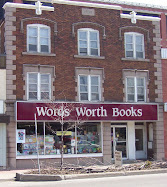
 Nikolski by Nicholas Dickner
Nikolski by Nicholas Dickner Intricately plotted and shimmering with originality, Nikolski charts the curious and unexpected courses of personal migration, and shows how they just might eventually lead us to home. In the spring of 1989, three young people, born thousands of miles apart, each cut themselves adrift from their birthplaces and set out to discover what — or who — might anchor them in their lives. They each leave almost everything behind, carrying with them only a few artefacts of their lives so far — possessions that have proven so formative that they can’t imagine surviving without them — but also the accumulated memories of their own lives and family histories. Noah, who was taught to read using road maps during a life of nomadic travels with his mother — their home being a 1966 Bonneville station wagon with a silver trailer — decides to leave the prairies for university in Montreal. But putting down roots there turns out to be a more transitory experience than he expected. Joyce, stifled by life in a remote village on Quebec’s Lower North Shore, and her overbearing relatives, hitches a ride into Montreal, spurred on by a news story about a modern-day cyber-pirate and the spirit of her own buccaneer ancestors. While her daily existence remains surprisingly routine —working at a fish shop in Jean-Talon market, dumpster-diving at night for necessities — it’s her Internet piracy career that takes off. And then there’s the unnamed narrator, who we first meet clearing out his deceased mother’s house on Montreal’s South Shore, and who decides to move into the city to start a new life. There he finds his true home among books, content to spend his days working in a used bookstore and journeying though the many worlds books open up for him. It is in the magical accumulation of those details around the edges of their lives that we begin to know these individuals as part of a greater whole, and ultimately realize that anchors aren’t at all permanent, really; rather, they’re made to be hoisted up and held in reserve until their strength is needed again.
Also featured in the debate was The Jade Peony by Wayson Choy
 In the Chinatown of 1940s Vancouver, three children of Chinese immigrant parents nurture dreams of making their own mark on the world around them. Jung-Sum is an adopted son who fights in the boxing ring - and wrestles with uncertainty about his own sexual identity. Jook-Liang dreams of escaping the confines of tradition to become the next Shirley Temple, and Sekky, the youngest child, surprises the rest of the family with his own quiet wisdom. Wayson Choy's Chinatown is a community of unforgettable individuals who are “neither this nor that,” neither entirely Canadian nor Chinese. But with each other's help, they survive hardship and heartbreak with grit and humour.
In the Chinatown of 1940s Vancouver, three children of Chinese immigrant parents nurture dreams of making their own mark on the world around them. Jung-Sum is an adopted son who fights in the boxing ring - and wrestles with uncertainty about his own sexual identity. Jook-Liang dreams of escaping the confines of tradition to become the next Shirley Temple, and Sekky, the youngest child, surprises the rest of the family with his own quiet wisdom. Wayson Choy's Chinatown is a community of unforgettable individuals who are “neither this nor that,” neither entirely Canadian nor Chinese. But with each other's help, they survive hardship and heartbreak with grit and humour.

No comments:
Post a Comment